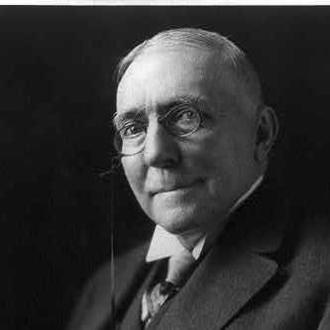Kolačići su neophodni za funkcionalnost internetske stranice i omogućavaju vam da ostanete prijavljeni. Pomoću kolačića prikupljamo i statističke podatke. Oni nam pomažu da saznamo kako koristite Bookmate kako bi mogli poboljšati internetsku stranicu i preporuke za knjige.
Za više informacija, pročitajte našu Politiku kolačića.
Za više informacija, pročitajte našu Politiku kolačića.
Prihvati sve kolačiće
Postavke kolačića

James Whitcomb Riley was born on October 7, 1849, in Greenfield, Indiana, to local attorney Reuben A. Riley and his wife, Elizabeth (Marine) Riley, in a small cabin. His parents named him after James Whitcomb, the governor of Indiana. Riley was influenced by many of the visitors to his father's home. In particular, he was able to pick up the cadence and character of the dialect of central Indiana and the travelers along the old National Road, which came through in the many poems he went on to write. One particular visitor was Mary Alice Smith, who eventually stayed on to live with the Rileys. Mary Alice ("Allie") Smith influenced Riley's poem, Little Orphant Annie, which was originally to be called Little Orphant Allie but a typesetter's error changed the name of the poem.[3]Riley was never a great student. Before he dropped out of school at age 16, a former teacher encouraged him to appreciate nature. He attempted to study law in his father's law office, however he found that the law was not for him, whereupon he took several different jobs in rapid succession.Riley had his first poem published in 1870 when he was 21. He began writing for several newspapers, eventually working for the Indianapolis Journal in Indianapolis, Indiana writing miscellaneous articles, versifying whenever possible.Riley's big break came with the private publishing of a thousand copies of The Old Swimmin' Hole and 'Leven More Poems in 1883 under the pseudonym of "Benjamin F. Johnson, of Boone". The book rapidly sold all of the first printing, causing Indianapolis book publisher Merrill, Meigs and Company to quickly contract with Riley to publish the second edition of The Old Swimmin' Hole and 'Leven More Poems. Riley continued to work with the publishing company which eventually became Bowen-Merrill and finally Bobbs-Merrill. The 1886 publishing The Boss Girl began to publish new Riley literature regularly. As a result he began to tour the United States giving lectures, starting in the mid-1880s.In 1893 he was invited to live at the residence of Charles and Magdalena Holstein within the Indianapolis neighborhood of Lockerbie. He would call this his permanent residence for the last 23 years of his life, although he eventually purchased his childhood home, and allowed his brother, John Riley, to live there.He was in demand throughout his life, including being a guest at the White House. He was elected to the American Academy of Arts and Letters. In 1912 the National Institute of Arts and Letters gave him the gold medal of poetry, the first poet so honored. He also received several honorary degrees.Riley loved children, but he never had any of his own; he also never married. Evidence points that he regretted his bachelorhood and childlessness. Many believe that his poems about and for children were written due to this regret. Others attribute his poems to his regrets over alcoholism and his possible affliction with syphilis.Indiana honored Riley after his death in 1916 by burying him in Crown Hill Cemetery in Indianapolis. The site of his grave is atop Strawberry Hill, the highest point in Indianapolis, offering a spectacular view of the city. Although Riley's poetry has fallen out of popularity, a few of his poems, such as Little Orphant Annie and Lockerbie Street, continue to be taught in schools in Indiana.In 1916 a group of prominent citizens from Indianapolis organized the Riley Memorial Association (now the Riley Children's Foundation) to build a children's hospital in memory of the Hoosier Poet. The James Whitcomb Riley Hospital for Children opened in 1924.The foundation also purchased the poet's home in his later years in downtown Indianapolis; it is maintained as a museum and today, the James Whitcomb Riley Museum Home is the only late-Victorian home in Indiana that is open to the public, and the country's only late-Victorian preservation, featuring authentic furniture and decor from that era. His birthpla
više
Knjige
fb2epub
Povucite i ispustite datoteke
(ne više od 5 odjednom)
